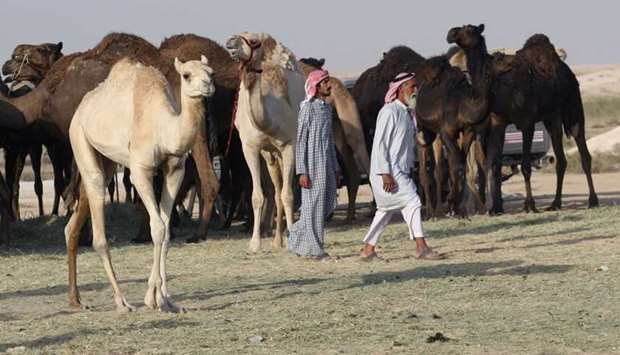Thousands of camels continued to cross Saudi Arabia’s desert border into Qatar yesterday and were reunited with their owners after being stranded for days at a frontier shut because of the ongoing diplomatic crisis, Reuters reports.
Qatari men in traditional white robes waited in SUVs at the border to identify their camels as the beasts trotted across the remote frontier, braying and kicking up dust.
"Thank God I have my camels back!" said Ali Magareh, 40, waiting with his seven-year-old son at the crossing point. "For one week they kept them waiting there. The camels were starving. Some of the males were fighting and in very bad condition," he said.
A June 5 decision by Saudi Arabia and other Arab states to cut diplomatic ties and all transport links with Qatar has disrupted trade and split families.
Tribesmen in Qatar whose relatives span the modern-day borders of the Arabian Peninsula say the boycott is threatening traditions dear to them, including camel herding and falconry.
Hundreds of Qataris keep camels in desert areas in eastern Saudi Arabia during the winter months to train and breed them for races and beauty contests - customs seen as an important link to a vanishing nomadic past. Prize camels sell in auctions for hundreds of thousands of dollars.
Pictures of Asian workers tending to camels languishing on the Saudi side of the border have been published in Qatari newspapers, sparking outrage.
The Qatari government sent a convoy of water tankers and trucks carrying grass to the border on Monday to nourish the camels that had crossed the border.
Yesterday, Gulf Times reported that Qatar’s Ministry of Municipality and Environment (MME) had allocated temporary plots of land for more than 7,000 camels and 5,000 goats and sheep brought back from Saudi Arabia. In a tragic turn of event, as many as 100 baby camels died while trying to return to Qatar, as they had to walk 400km in 48C heat.
Officials at the MME's livestock department is currently counting the numbers of camels that have already been brought back from Saudi Arabia and those expected to arrive soon so as to provide them with adequate supply of fodder.

Camels cross Saudi Arabia's remote desert border into Qatar


